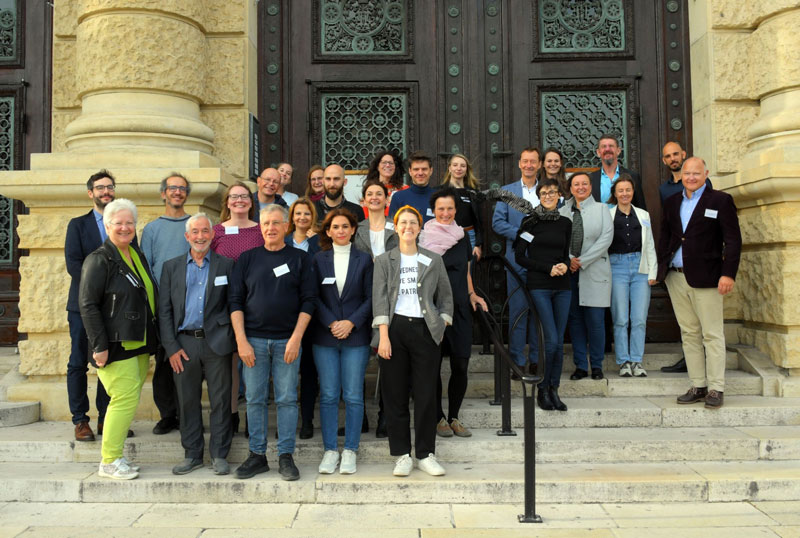by Katharina Flicker (EOSC Support Office Austria, SBA Research, TU Wien), Stefan Hanslik (BMBWF), Tereza Kalová (Vienna University Library, University of Vienna)
In 2015, the vision of a European federated and open multi-disciplinary environment, known as the European Open Science Cloud (EOSC), was born. EOSC represents a significant leap towards more integrated and accessible scientific resources across Europe. In this context, the EOSC Support Office Austria (EOSC SOA) was launched to coordinate Austria’s contributions to EOSC’s implementation. If you are interested in exploring how EOSC and EOSC SOA are shaping the future of research and why they are crucial for the ERCIM community, continue reading.
The vision of EOSC was brought forth in order to help researchers, innovators, companies and citizens find and reuse data, tools and services by developing a Web of FAIR data and services [L1]. While the EOSC Associa tion was established to guide this initiative on the European level [L2], many countries are laying the foundations for national nodes, ensuring that national needs are incorporated into the strategic planning of EOSC (e.g. via the SRIA [L3]). Against this background, the EOSC Support Office Austria (EOSC SOA) was formed in Austria in 2021 by ACOnet as the Mandated Organization, commissioned by the Federal Ministry of Education, Science and Research (BMBWF). Its establishment also involved CCCA, FAIR Office Austria, JKU, Natural History Museum Vienna, TU Wien, TU Graz and the University of Vienna. Since then, numerous institutions and initiatives have joined the growing EOSC SOA community: the Academy of Fine Arts Vienna, Ludwig Boltzmann Gesellschaft, Open Knowledge Maps, UBIFO, the University of Graz, Vetmeduni and WU Wien. This demonstrates the broad scope of organisations for whom the EOSC is of core interest and their commitment to collaborating to prepare for and benefit from these developments.
EOSC SOA aims to coordinate Austrian contributions in the implementation of EOSC while fostering EOSC readiness in terms of infrastructure and staff training at partner institutions. Additionally, it supports the development of Austrian Open Science policies [L4]. A broad variety of activities are employed to achieve this aim. These include EOSC SOA Working Groups [L5] (WGs), the EOSC Café [L6], participation in EOSC-related projects such as EOSC Focus [L7] and Skills4EOSC[L8], participation in both former [L9] and new [L10] EOSC Association Task Forces as well as regular exchange with both national and European stakeholders and within the EOSC Association. To share information with partner institutions, as well as to bridge between EOSC and GAIA-X, two similar initiatives that are both highly relevant to research-performing organisations, ERCIM established a working group. The goals and activities of these groups are as follows.
EOSC SOA WGs aim to progress topics relevant to EOSC. To achieve this, they organise events and workshops, conduct surveys, or draft recommendations on particular subjects. They are time-bound and focus on specific topics. External experts can be invited if needed. Currently, there are five WGs: Austrian Country Report, Collections, Researcher Engagement in Austria, Technical Infrastructure, and Training.
As one of the working tools, the EOSC Café serves as a collaborative and open forum with the EOSC SOA, bringing together experts from both within and outside the initiative. These experts come from various disciplines of science and research, research policy, society, and the industry. They provide the EOSC Support Office with valuable external insights and perspectives while supporting EOSC-related activities both domestically and across Europe. EOSC Café participants meet up at least three times per year.
The ERCIM working group initially convened during the ERCIM spring meetings in 2022. Several participants met to explore the opportunities and impact of EOSC and Gaia-X, aiming to ensure future developments are beneficial to ERCIM members. The working group usually meets during the spring and fall meetings to exchange updates on recent events. During this period, members conducted informal surveys on the perception and evaluation of both EOSC and Gaia-X within their institutions.
It became evident that while both initiatives lacked sufficient tangible results to be actionable at the management level, their significance was widely acknowledged, highlighting the need for regular information exchange. Against this background, it was decided to closely monitor their developments and prepare to be ready for upcoming advancements. As EOSC and GAIA-X gain momentum with the development and rollout of services, a major impact on research-performing organisations is expected. Thus, early alignment, the establishment of national support structures, as well as the creation of contact points at research institutes, will facilitate readiness for these developments. This approach aims to effectively integrate, operate, and utilise these initiatives to the benefit of researchers and their research outcomes.

Group photo, 3rd General Assembly of the EOSC Support Office Austria / Austrian EOSC Mandated Organisation, in the Museum of Natural History Vienna. 18 October 2023. Photo: ©NHM Wien, Alice Schumacher.
Links:
[L1] https://research-and-innovation.ec.europa.eu/strategy/strategy-2020-2024/our-digital-future/open-science/european-open-science-cloud-eosc_en
[L2] https://eosc.eu/
[L3] https://op.europa.eu/en/publication-detail/-/publication/f9b12d1d-74ea-11ec-9136-01aa75ed71a1
[L4] https://eosc-austria.at/
[L5] https://eosc-austria.at/working-groups/
[L6] https://eosc-austria.at/eosc-austria/governing-bodies/
[L7] https://eosc.eu/eosc-focus-project/
[L8] https://www.skills4eosc.eu/
[L9] https://eosc.eu/eosc-association/eosc-task-forces/eosc-a-task-forces-2021-2023/
[L10] https://eosc.eu/eosc-task-forces/
Please contact:
EOSC Support Office Austria











